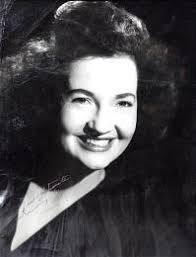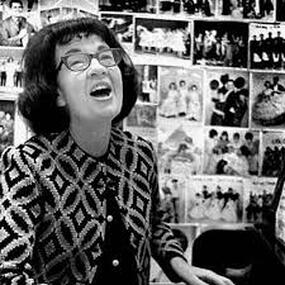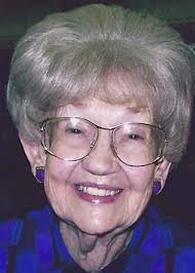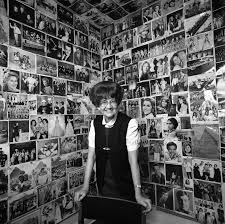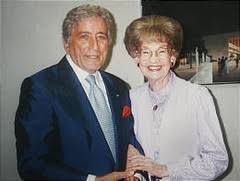BYU legend Janie Thompson launched careers, touched lives as founder of Young Ambassadors, Lamanite Generation
By Emma Penrod Jun 8, 2013, 8:57pm MDT Deseret News
PROVO — Sandi Griffiths attended her first audition at BYU as a spectator, initially feeling too shy to try out herself. But the director, Janie Thompson, had no ill words for the plethora of hopefuls. If a student really couldn't sing, she smiled and said, "Oh, you're wonderful! Could you carry a flag?"
Watching Thompson, Griffiths worked up the courage to sing "I'm as Corny as Kansas in August."
"She changed the course of my life," said Griffiths, who later sang on "The Lawrence Welk Show" for 12 years.
Thompson, who died June 1, 2013 at the age of 91, had a chance at her own career as a professional entertainer, but gave it up to mentor others as the founder of the Student Program Bureau. She ultimately founded six groups at BYU, two of which, the Young Ambassadors and Living Legends, continue to tour internationally today. She continued writing and producing shows after her retirement and published more than 100 musical works.
But her greatest accomplishment, those who knew her say, was mothering the students she considered her children.
"She had a superpower, if you ask me, to know the potential of her students," her niece, Barbara Acheson, said. "She could look past the makeup and clothes right into the soul and pull that out."
International legacy
Thompson became the founder of a BYU entertainment initiative then known as the Student Program Bureau in 1952. BYU President Ernest Wilkinson called to ask her to start it shortly after she returned from a mission for The Church of Jesus Christ of Latter-day Saints. She had received a job offer from the Ike Carpenter band earlier that same day and was less than thrilled about giving up her opportunity with Ike Carpenter, but she considered Wilkinson's invitation a calling from God.
Randy Boothe, who performed with the Young Ambassadors during their first international tour, said the BYU job also helped align Thompson with her personal vision of using music to spread the gospel.
"She saw great opportunities — doors were opening for her right and left, but she also had opportunities to use her talents to sell cigarettes," said Boothe, now the director of the Young Ambassadors himself. "She thought to herself, 'I'm not going to use my talents to sell that.' What she was selling at BYU was everything that was good with the youth of America."
During her first four years, she put on more than 2,000 shows, traveling to every high school in Utah. At the same time, she put together several youth productions for the Young Women's Mutual Improvement Association. She burned out and then moved to New York for three years to teach in a professional studio.
Wilkinson eventually called again, and Thompson returned to BYU in 1959. She embarked on the school's first international tour a year later.
The Young Ambassadors came together a decade later, when BYU was invited to send a group to represent the U.S. at the 1970 world expo in Osaka, Japan. Boothe, who had played in a band for another BYU performing group, was recruited as a singer/dancer for the Young Ambassadors.
"We performed on the grand stage, which was separated from the main area by a fountain, like at the Bellagio," he said. "It was the first time anyone had seen water move to music with lights like that."
The band that accompanied the Young Ambassadors played from a motorized stage that moved around the fountain during the show, Boothe said.
"The international audiences just loved the group," Boothe said. "Year after year after that, they received invitations."
The Young Ambassadors have since performed in nearly 60 countries.
Thompson founded Living Legends in 1971. Originally called Lamanite Generation, the group featured Native American youths. Latin American and Polynesian cultures were added to later iterations of the show.
Early years
Thompson grew up in the small southern Idaho town of Malta, the oldest of seven children in an exceptionally musical family; several of her siblings went on to succesful careers in opera. The family had a single upright piano but no money for music lessons. Thompson taught herself to play, starting with melodies and harmonies on one hand, then picking out left-hand parts as well.
When her siblings began to play as well, "Their mom had to lock the piano to keep the kids from fighting over it," Acheson said.
The family later found a piano teacher for Thompson, and she took a few years of lessons before continuing her musical studies at BYU in the fall of 1939. She worked her way through school by playing piano for dance classes, according to a memoire from the BYU School of Music. When the dancers learned Thompson knew how to make up new music on the spot for their routines, she soon ended up playing for other schools, as well.
She later worked up the courage to join a band as a singer, and before long began singing with a few other groups playing in the Provo area. Then, she heard the miliary was hiring performers to entertain the troops overseas and realized she could fulfill her dream of traveling around the world.
She sang with several stars during her two years with "America's Band" in Germany, including Tony Bennett. She also met a young serviceman, called "Johnny" in her memoire, who Acheson said was the love of Thompson's life. He was a fellow entertainer, a child star on Broadway who later went on to Hollywood. However, he did not share Thompson's LDS faith, so Thompson decided against marrying him.
Personal trademark
Thompson was never known to do anything halfway. Her shows were consistently elaborate, with large casts and colorful costumes. To make her grand visions a reality, Thompson often did whatever a show required — building sets and props, sewing costumes and writing music.
"She always had fun, great ideas, and always wanted to do things big, and bigger, with thousands of performers and millions of flags," Boothe said. "She kind of invented the spectacular."
Rehearsals with her were often long and difficult, Boothe said. She had high expectations and wanted to see each student achieve his full potential, both on and off the stage.
"She got so many guys and girls together that are now married," Boothe said. "She would organize a whole party so that two people she wanted to get together could dance."
Her dedication to her students was even more apparent at home, where she would pray for each one by name, Acheson said. Thompson aimed to remove whatever barriers prevented a talented student's success, and in some cases even brought food to students who struggled financially.
"Although she never had any biological children, she has more children than anyone," Acheson said. Thompson covered the walls of her office with pictures of her students. "Everyone felt a connection with her. Even in her age, her mind was sharp, and she could recall relationships from all walks of life."
She also created a scholarship fund, using the proceeds from sales of her own recordings, said K. Newell Dayley, an LDS composer who played in bands with some of Thompson's groups and who later became the dean of BYU's College of Fine Arts and Communications. He is now the dean of Utah Valley University's School of the Arts.
Thompson incorporated her spirit of service into the touring groups she founded, people who knew her say. Her entertainers perform at hospitals and orphanages by day and at grand international venues by night.
Lifelong legacy
She retained an office at BYU after retiring in 1984 and continued working on reunion shows, church-related youth productions and other projects. She reported to that office daily for several years, until the building that contained it was demolished. Then, she moved her studio to her house, where she continued composing.
Thompson was extremely patriotic and remained involved with America's Freedom Festival at Provo for several years after her retirement. One of her favorite productions, Acheson said, was a show she created for the LDS Church to celebrate the bicentennial of the Constitution.
She had at least two shows in the works when she passed away. Up to two weeks before her death she had planned to play piano in a production her brother had put together.
"I don't know how she kept it all going, but she lived a very full life," Boothe said. "She was pretty busy and involved, and we all loved her."
Life of music exceeds wildest expectationsJanie Thompson honored on 80th birthday
By Shaun D. Stahle, Church News staff writer
1 Sept 2001, 12:00 AM MDT
PROVO, Utah — In 1952, Janie Thompson was young, bubbling with enthusiasm and held the distinct promise of someday seeing her name in bright lights.
She had just returned from serving a mission in Wales and had been invited to resume her place as vocalist in the popular Ike Carpenter Band in California.
Her path in life suddenly seemed clear.
But when she arrived in Los Angeles to join the band — just as she stepped across the threshold of her roommate's home — "The phone rang," she said. "It was a representative of President Ernest L. Wilkinson's office asking me to return to BYU to direct the student program bureau.
"My heart sank," she said. This was not the plan. Her dreams were dashed. But she had been taught by devoted parents to accept every opportunity to serve. With tears in her eyes, she returned to Provo.
When she reported for work that fall, "They didn't know where to put me," she said with a chuckle. "My first office was a desk in a basement hallway of the Maeser building. Space at BYU was always at a premium."
Now 49 years later, as hundreds of lifelong friends greeted her during an open house honoring her on her 80th birthday Aug. 25, she was able to measure how her life has exceeded her wildest ambitions.
"I have been everywhere," she said, taking a line from one of her songs. "I have received such countless blessings that it is overwhelming to me."
Standing on the very floor where many of her BYU performing groups trained, friend after friend filed by to thank her for her vim and vigor and love.
"I remember them as they were," she said. "They looked great, although I hadn't seen some of them for many years."
Sister Thompson is credited with developing many of BYU's highly influential international performing groups that have offered wholesome entertainment and opened missionary doors for decades. But in the heart of countless students and spectators, she is endeared by her bubbly love of life, and the gospel.
From behind her basement desk, during those early years at BYU, her original assignment was to develop student talent and prepare groups for performance as a public service by the university.
It was an important assignment that she took seriously, though she felt the performing groups had higher purposes than merely entertaining at high schools and local functions.
She saw performing groups as ambassadors for the Church who could open doors for missionary work.
She was determined to succeed. At times, that meant wheeling a piano into the ladies rest room when the custodians weren't looking so she could hone and perfect routines without disruption. Standing at the keyboard, she'd play while tapping out the dance routine with her feet.
For 29 years, until she retired in 1984, she directed BYU's Program Bureau performing groups. For a string of years she organized a new group each year to meet entertainment demands. The two groups still performing are the Young Ambassadors and the Lamanite Generation, now known as Living Legends, both of which have been active for more than 30 years each, under uniquely capable directors.
Music has always been a part of Sister Thompson's life. As the oldest of seven children, she was raised in a musical family in Malta, Idaho. "My mother and father were so musically talented," she said. Her father sang bass while her mother was a dramatic soprano. "She was the best singer the Lord ever put on the earth," she said.
Sister Thompson played the piano from the time she was tall enough to reach the keys. "If you've got talent, you can't stop it," she said, breaking into song, remembering the first tune she plunked out on the piano.
A heavenly hand has guided the performing groups from the beginning, Sister Thompson said. "We were successful because we were clean-cut, fun and performed fast-moving programs with good music, modest but attractive costumes, and enjoyable but non-suggestive humor. The students sparkled with the joy of life and it showed in their performances."
The first opportunity to perform overseas came in 1960. Sponsored by the U.S. Defense Department, the BYU troupe, "Curtain Time," entertained servicemen in the Pacific. Cast members had been warned that the only way to entertain a military audience was with scanty costumes and coarse humor.
When they arrived in Naha, on the island of Okinawa, they learned that an audience of rowdy Marines had recently "thrown things at another college group and booed them off the stage."
During the devotional prior to their performance, Sister Thompson emphasized that they would not alter the show and encouraged cast members to do the best they'd ever done and, "just be their exemplary selves."
From the moment they stepped onto the stage shouting "Curtain Time, Curtain Time," Sister Thompson said, the audience was infected with our enthusiasm. "They became our favorite audience of that tour."
The show ended with an upbeat patriotic theme that had the Marines standing with tears in their eyes while clapping and clapping.
The Defense Department invited performing groups only once every two years. But so successful was this tour and the next tour in 1962, that the military altered its rule and invited BYU groups to perform every year for 14 consecutive years until 1976 when BYU changed its touring policy.
The full measure of good may never be known, but Sister Thompson has received enough feedback to nearly fill a large book she is preparing that recounts the spiritual results of her groups.
She recalled an incident in the mid-1980s when a former performer was sitting with her husband at a luncheon attended by many regional representatives who were in the Salt Lake City area during general conference.
During the luncheon, this performer mentioned to a regional representative from the Philippines that she had been to his country in 1965. She described the night her troupe performed in the palatial home of a member. The regional representative listened with increasing interest as he realized that he had attended that very performance as a 15-year-old non-member teenager. He remembered the show well enough to describe the cowgirl costume she wore in the opening act.
He then told how his family had not been interested in the Church, but they were impressed with the missionaries and accepted an invitation to attend the show. The feelings of the evening motivated them to reconsider their attitude toward the gospel, which led to their eventual conversion.
Another incident that highlighted the missionary value of the performing groups came one day in the 1970s as Sister Thompson was walking through the Wilkinson Center on the BYU campus. A young man "obviously in a hurry to class," abruptly stopped and said, "I've been meaning to tell you something. I first learned of the Church in 1965 when I was a wounded serviceman from the Vietnam War, recovering at the Clark Air Force Base in the Philippines."
He recounted how performers came into the hospital and went throughout the rooms greeting and singing to the wounded. "I felt something special about your group and I wanted to learn more about your Church," he said. As a result, he joined and served a mission before enrolling as a full-time student.
"I didn't even get his name," Sister Thompson said.
Sister Thompson continues to sing and perform for select audiences. Her voice is clear and her fingers are nimble on the keys. She doesn't feel any older, she says, but she knows the mirror doesn't lie. Still, despite the change in hair color and the number of birthday candles, it's as true today as it was years ago when it was written, "Anyone who tries to bottle the essence of Janie Thompson will have a hard time capturing all the bubbles."
By Shaun D. Stahle, Church News staff writer
1 Sept 2001, 12:00 AM MDT
PROVO, Utah — In 1952, Janie Thompson was young, bubbling with enthusiasm and held the distinct promise of someday seeing her name in bright lights.
She had just returned from serving a mission in Wales and had been invited to resume her place as vocalist in the popular Ike Carpenter Band in California.
Her path in life suddenly seemed clear.
But when she arrived in Los Angeles to join the band — just as she stepped across the threshold of her roommate's home — "The phone rang," she said. "It was a representative of President Ernest L. Wilkinson's office asking me to return to BYU to direct the student program bureau.
"My heart sank," she said. This was not the plan. Her dreams were dashed. But she had been taught by devoted parents to accept every opportunity to serve. With tears in her eyes, she returned to Provo.
When she reported for work that fall, "They didn't know where to put me," she said with a chuckle. "My first office was a desk in a basement hallway of the Maeser building. Space at BYU was always at a premium."
Now 49 years later, as hundreds of lifelong friends greeted her during an open house honoring her on her 80th birthday Aug. 25, she was able to measure how her life has exceeded her wildest ambitions.
"I have been everywhere," she said, taking a line from one of her songs. "I have received such countless blessings that it is overwhelming to me."
Standing on the very floor where many of her BYU performing groups trained, friend after friend filed by to thank her for her vim and vigor and love.
"I remember them as they were," she said. "They looked great, although I hadn't seen some of them for many years."
Sister Thompson is credited with developing many of BYU's highly influential international performing groups that have offered wholesome entertainment and opened missionary doors for decades. But in the heart of countless students and spectators, she is endeared by her bubbly love of life, and the gospel.
From behind her basement desk, during those early years at BYU, her original assignment was to develop student talent and prepare groups for performance as a public service by the university.
It was an important assignment that she took seriously, though she felt the performing groups had higher purposes than merely entertaining at high schools and local functions.
She saw performing groups as ambassadors for the Church who could open doors for missionary work.
She was determined to succeed. At times, that meant wheeling a piano into the ladies rest room when the custodians weren't looking so she could hone and perfect routines without disruption. Standing at the keyboard, she'd play while tapping out the dance routine with her feet.
For 29 years, until she retired in 1984, she directed BYU's Program Bureau performing groups. For a string of years she organized a new group each year to meet entertainment demands. The two groups still performing are the Young Ambassadors and the Lamanite Generation, now known as Living Legends, both of which have been active for more than 30 years each, under uniquely capable directors.
Music has always been a part of Sister Thompson's life. As the oldest of seven children, she was raised in a musical family in Malta, Idaho. "My mother and father were so musically talented," she said. Her father sang bass while her mother was a dramatic soprano. "She was the best singer the Lord ever put on the earth," she said.
Sister Thompson played the piano from the time she was tall enough to reach the keys. "If you've got talent, you can't stop it," she said, breaking into song, remembering the first tune she plunked out on the piano.
A heavenly hand has guided the performing groups from the beginning, Sister Thompson said. "We were successful because we were clean-cut, fun and performed fast-moving programs with good music, modest but attractive costumes, and enjoyable but non-suggestive humor. The students sparkled with the joy of life and it showed in their performances."
The first opportunity to perform overseas came in 1960. Sponsored by the U.S. Defense Department, the BYU troupe, "Curtain Time," entertained servicemen in the Pacific. Cast members had been warned that the only way to entertain a military audience was with scanty costumes and coarse humor.
When they arrived in Naha, on the island of Okinawa, they learned that an audience of rowdy Marines had recently "thrown things at another college group and booed them off the stage."
During the devotional prior to their performance, Sister Thompson emphasized that they would not alter the show and encouraged cast members to do the best they'd ever done and, "just be their exemplary selves."
From the moment they stepped onto the stage shouting "Curtain Time, Curtain Time," Sister Thompson said, the audience was infected with our enthusiasm. "They became our favorite audience of that tour."
The show ended with an upbeat patriotic theme that had the Marines standing with tears in their eyes while clapping and clapping.
The Defense Department invited performing groups only once every two years. But so successful was this tour and the next tour in 1962, that the military altered its rule and invited BYU groups to perform every year for 14 consecutive years until 1976 when BYU changed its touring policy.
The full measure of good may never be known, but Sister Thompson has received enough feedback to nearly fill a large book she is preparing that recounts the spiritual results of her groups.
She recalled an incident in the mid-1980s when a former performer was sitting with her husband at a luncheon attended by many regional representatives who were in the Salt Lake City area during general conference.
During the luncheon, this performer mentioned to a regional representative from the Philippines that she had been to his country in 1965. She described the night her troupe performed in the palatial home of a member. The regional representative listened with increasing interest as he realized that he had attended that very performance as a 15-year-old non-member teenager. He remembered the show well enough to describe the cowgirl costume she wore in the opening act.
He then told how his family had not been interested in the Church, but they were impressed with the missionaries and accepted an invitation to attend the show. The feelings of the evening motivated them to reconsider their attitude toward the gospel, which led to their eventual conversion.
Another incident that highlighted the missionary value of the performing groups came one day in the 1970s as Sister Thompson was walking through the Wilkinson Center on the BYU campus. A young man "obviously in a hurry to class," abruptly stopped and said, "I've been meaning to tell you something. I first learned of the Church in 1965 when I was a wounded serviceman from the Vietnam War, recovering at the Clark Air Force Base in the Philippines."
He recounted how performers came into the hospital and went throughout the rooms greeting and singing to the wounded. "I felt something special about your group and I wanted to learn more about your Church," he said. As a result, he joined and served a mission before enrolling as a full-time student.
"I didn't even get his name," Sister Thompson said.
Sister Thompson continues to sing and perform for select audiences. Her voice is clear and her fingers are nimble on the keys. She doesn't feel any older, she says, but she knows the mirror doesn't lie. Still, despite the change in hair color and the number of birthday candles, it's as true today as it was years ago when it was written, "Anyone who tries to bottle the essence of Janie Thompson will have a hard time capturing all the bubbles."
